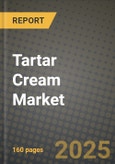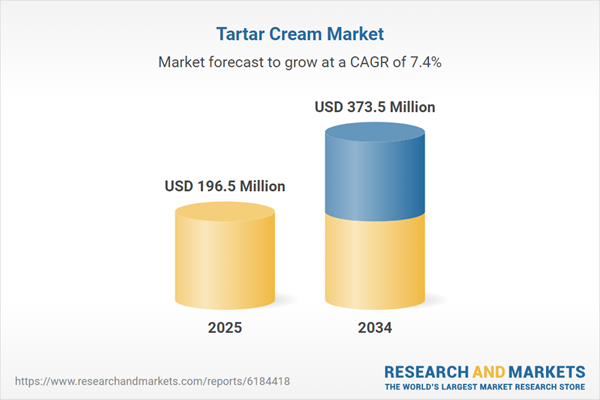Tartar Cream Market
The tartar cream market is built on the recovery and purification of potassium bitartrate formed during wine fermentation and storage, then processed into food- and pharma-grade powders. Its core demand comes from bakery and confectionery: as an acidulant and stabilizer in meringues and whipped egg whites, to activate baking soda in single- and double-acting baking powders, to prevent sugar crystallization in candies/syrups/caramels, and to maintain volume in angel cakes and chiffon products. Secondary outlets include beverage and processed-food pH control, household/cleaning and descaling products, and limited technical/analytical uses. Because the raw material is tied to grape/wine output, supply is somewhat seasonal and geographically concentrated, so refiners focus on consistent purity, low heavy metals, correct particle size, and compliant packaging to meet food-safety and export requirements. Market growth is supported by the steady expansion of commercial and artisanal baking, the rise of clean-label/“short ingredient list” products (cream of tartar is a familiar kitchen name), and home-baking and HoReCa channels that prefer dry, shelf-stable acidulants over liquids. Challenges include dependence on wine industry residues, competition from alternative acidulants (citric, lactic, glucono-delta-lactone), the need for origin traceability in premium markets, and cost/availability swings when grape harvests vary. As bakery, confectionery, and packaged-food makers standardize recipes across regions, they look for tartar cream suppliers who can guarantee food/pharma grades, microbiological safety, allergen-free handling, and flexible pack sizes - from bulk bags for industrial lines to small packs for retail/private label.Tartar Cream Market Key Insights
- Bakery is the anchor segment. Whipped egg products, angel/chiffon cakes, and baking powders rely on cream of tartar’s dependable acidity and compatibility with sodium bicarbonate.
- Confectionery likes its anti-crystallization. Tartar cream helps keep syrups and candies smooth, reducing rework and texture defects, especially in premium or high-sugar lines.
- Supply tracks wine. Regions with strong wine/viticulture output have more stable upstream feed; bad harvests or shifts in winemaking practices can tighten availability.
- Clean-label halo. Being a well-known pantry acid gives cream of tartar an edge over more “chemical-sounding” alternatives in artisan and natural bakery.
- Industrial buyers want consistency. Tight specs on acidity (KHC₄H₄O₆ content), moisture, and particle size reduce formulation adjustments and machine fouling.
- Competitors are flexible acids. Citric and GDL can sub in some bakery and beverage applications; cream of tartar must stress performance in foams, taste neutrality, and tradition.
- Packaging matters. Moisture-barrier, caking-resistant packs are needed in humid markets; smaller, private-label retail sizes support home-baking waves.
- Food safety and traceability. HACCP, allergen control, and origin documentation are purchase gates for global bakery and QSR suppliers.
- Nonfood uses add stability. Household cleaning/descaling, DIY products, and lab/technical use absorb small volumes and help diversify channels.
- Value in blends. Suppliers that deliver ready-to-use baking powder or bakery additive blends can lock in customers beyond commodity cream of tartar
Tartar Cream Market Reginal Analysis
North America
Strong commercial and in-store bakery, QSR desserts, and home-baking niches support steady demand. Buyers favor certified, consistent, low-moisture material and convenient retail/private-label packs. Clean-label positioning resonates.Europe
Proximity to wine-producing regions supports supply; artisan/patisserie and confectionery segments value performance and origin traceability. Strict food-safety and packaging rules apply; organic/natural claims are gaining.Asia-Pacific
Rapid expansion of Western-style bakery chains, café cultures, and home-baking e-commerce drives imports. Humid climates increase the need for anti-caking packaging. Price-sensitive buyers occasionally switch to citric, so reliability and training on formulations help.Middle East & Africa
Bakery and confectionery industrialization plus HoReCa growth create incremental demand, mostly met by imports. Long shelf life, halal-compliant documentation, and heat/humidity-resistant packaging are important.South & Central America
Local confectionery, bakery, and export-oriented food processors use cream of tartar mainly as an acidulant/stabilizer. Supply depends on importers or regional wine-linked production; competitive pricing and bulk formats drive adoption.Tartar Cream Market Segmentation
By Application
- Chemical
- Household
- Pharmaceutical
By Sales Channel
- Modern Trade
- Departmental and Traditional Grocery Store
- Convenience Stores
- Online Channels
- Others
Key Market players
ATP Group, McCormick & Company Inc., Alvinesa Natural Ingredients, Caviro Extra S.p.A., Productos Tártáricos S.A., Derivados Vínicos S.A., Distillerie Mazzari S.p.A., Tartricmed S.L., Vinicas S.A., Anhui Hailan Biotechnology Co. Ltd., Shanghai Jiangqing International Co. Ltd., Anhui Sealong Biobased Chemical Co. Ltd., Tate & Lyle PLC, Cargill Inc., Brenntag SETartar Cream Market Analytics
The report employs rigorous tools, including Porter’s Five Forces, value chain mapping, and scenario-based modelling, to assess supply-demand dynamics. Cross-sector influences from parent, derived, and substitute markets are evaluated to identify risks and opportunities. Trade and pricing analytics provide an up-to-date view of international flows, including leading exporters, importers, and regional price trends.Macroeconomic indicators, policy frameworks such as carbon pricing and energy security strategies, and evolving consumer behaviour are considered in forecasting scenarios. Recent deal flows, partnerships, and technology innovations are incorporated to assess their impact on future market performance.
Tartar Cream Market Competitive Intelligence
The competitive landscape is mapped through proprietary frameworks, profiling leading companies with details on business models, product portfolios, financial performance, and strategic initiatives. Key developments such as mergers & acquisitions, technology collaborations, investment inflows, and regional expansions are analyzed for their competitive impact. The report also identifies emerging players and innovative startups contributing to market disruption.Regional insights highlight the most promising investment destinations, regulatory landscapes, and evolving partnerships across energy and industrial corridors.
Countries Covered
- North America - Tartar Cream market data and outlook to 2034
- United States
- Canada
- Mexico
- Europe - Tartar Cream market data and outlook to 2034
- Germany
- United Kingdom
- France
- Italy
- Spain
- BeNeLux
- Russia
- Sweden
- Asia-Pacific - Tartar Cream market data and outlook to 2034
- China
- Japan
- India
- South Korea
- Australia
- Indonesia
- Malaysia
- Vietnam
- Middle East and Africa - Tartar Cream market data and outlook to 2034
- Saudi Arabia
- South Africa
- Iran
- UAE
- Egypt
- South and Central America - Tartar Cream market data and outlook to 2034
- Brazil
- Argentina
- Chile
- Peru
Research Methodology
This study combines primary inputs from industry experts across the Tartar Cream value chain with secondary data from associations, government publications, trade databases, and company disclosures. Proprietary modeling techniques, including data triangulation, statistical correlation, and scenario planning, are applied to deliver reliable market sizing and forecasting.Key Questions Addressed
- What is the current and forecast market size of the Tartar Cream industry at global, regional, and country levels?
- Which types, applications, and technologies present the highest growth potential?
- How are supply chains adapting to geopolitical and economic shocks?
- What role do policy frameworks, trade flows, and sustainability targets play in shaping demand?
- Who are the leading players, and how are their strategies evolving in the face of global uncertainty?
- Which regional “hotspots” and customer segments will outpace the market, and what go-to-market and partnership models best support entry and expansion?
- Where are the most investable opportunities - across technology roadmaps, sustainability-linked innovation, and M&A - and what is the best segment to invest over the next 3-5 years?
Your Key Takeaways from the Tartar Cream Market Report
- Global Tartar Cream market size and growth projections (CAGR), 2024-2034
- Impact of Russia-Ukraine, Israel-Palestine, and Hamas conflicts on Tartar Cream trade, costs, and supply chains
- Tartar Cream market size, share, and outlook across 5 regions and 27 countries, 2023-2034
- Tartar Cream market size, CAGR, and market share of key products, applications, and end-user verticals, 2023-2034
- Short- and long-term Tartar Cream market trends, drivers, restraints, and opportunities
- Porter’s Five Forces analysis, technological developments, and Tartar Cream supply chain analysis
- Tartar Cream trade analysis, Tartar Cream market price analysis, and Tartar Cream supply/demand dynamics
- Profiles of 5 leading companies - overview, key strategies, financials, and products
- Latest Tartar Cream market news and developments
Additional Support
With the purchase of this report, you will receive:- An updated PDF report and an MS Excel data workbook containing all market tables and figures for easy analysis.
- 7-day post-sale analyst support for clarifications and in-scope supplementary data, ensuring the deliverable aligns precisely with your requirements.
- Complimentary report update to incorporate the latest available data and the impact of recent market developments.
This product will be delivered within 1-3 business days.
Table of Contents
Companies Mentioned
- ATP Group
- McCormick & Company Inc.
- Alvinesa Natural Ingredients
- Caviro Extra S.p.A.
- Productos Tártáricos S.A.
- Derivados Vínicos S.A.
- Distillerie Mazzari S.p.A.
- Tartricmed S.L.
- Vinicas S.A.
- Anhui Hailan Biotechnology Co. Ltd.
- Shanghai Jiangqing International Co. Ltd.
- Anhui Sealong Biobased Chemical Co. Ltd.
- Tate & Lyle PLC
- Cargill Inc.
- Brenntag SE
Table Information
| Report Attribute | Details |
|---|---|
| No. of Pages | 160 |
| Published | November 2025 |
| Forecast Period | 2025 - 2034 |
| Estimated Market Value ( USD | $ 196.5 Million |
| Forecasted Market Value ( USD | $ 373.5 Million |
| Compound Annual Growth Rate | 7.4% |
| Regions Covered | Global |
| No. of Companies Mentioned | 15 |









